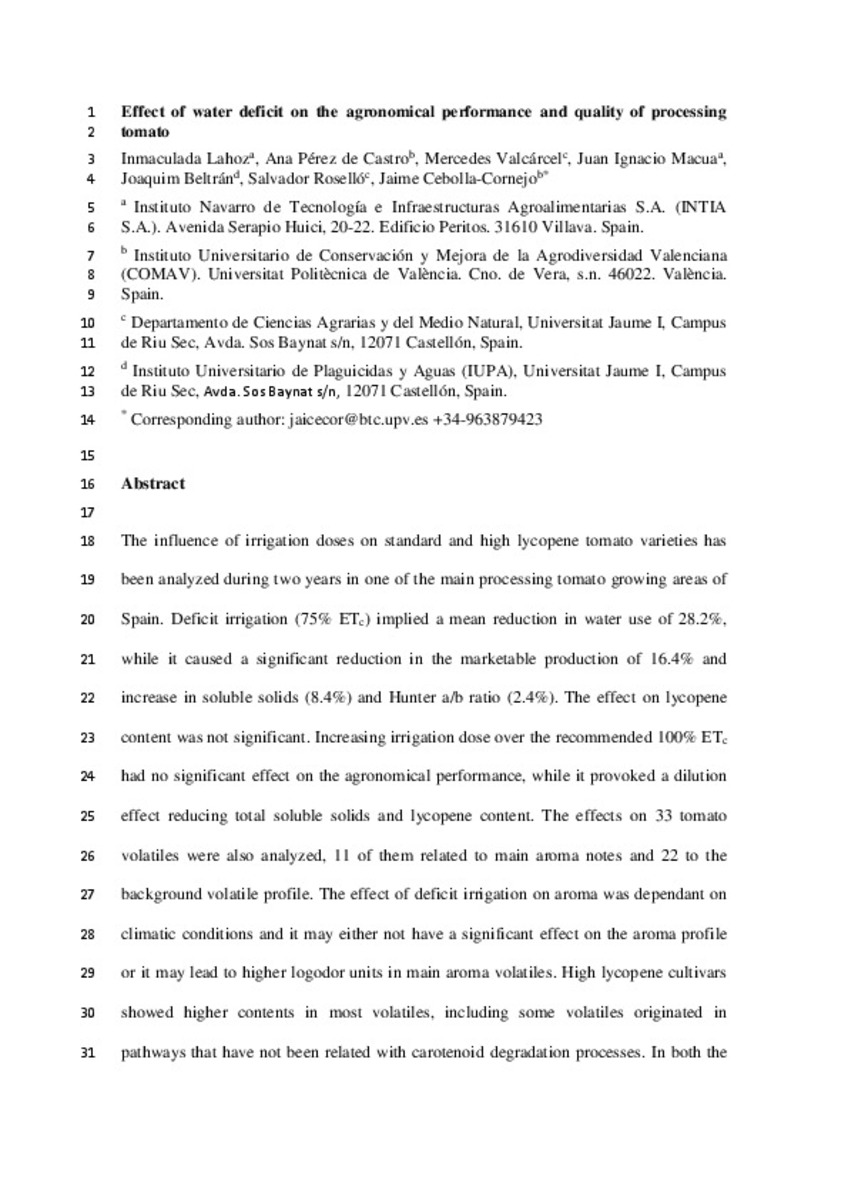Mostrar el registro sencillo del ítem
Effect of water deficit on the agronomical performance and quality of processing tomato
| dc.contributor.author | Lahoz García, Inmaculada | |
| dc.contributor.author | Pérez de Castro, Ana | |
| dc.contributor.author | Valcárcel, Mercedes | |
| dc.contributor.author | Macua, Juan Ignacio | |
| dc.contributor.author | Beltran Arandes, Joaquin | |
| dc.contributor.author | Roselló, Salvador | |
| dc.contributor.author | Cebolla-Cornejo, Jaime | |
| dc.date.accessioned | 2016-02-19T08:27:00Z | |
| dc.date.available | 2016-02-19T08:27:00Z | |
| dc.date.issued | 2015-03 | |
| dc.identifier.citation | LAHOZ, Inmaculada, et al. Effect of water deficit on the agronomical performance and quality of processing tomato. Scientia Horticulturae, 2016, vol. 200, p. 55-65. | ca_CA |
| dc.identifier.uri | http://hdl.handle.net/10234/150686 | |
| dc.description.abstract | The influence of irrigation doses on standard and high lycopene tomato varieties has been analyzed during two years in one of the main processing tomato growing areas of Spain. Deficit irrigation (75% ETc) implied a mean reduction in water use of 28.2%, while it caused a significant reduction in the marketable production of 16.4% and increase in soluble solids (8.4%) and Hunter a/b ratio (2.4%). The effect on lycopene content was not significant. Increasing irrigation dose over the recommended 100% ETc had no significant effect on the agronomical performance, while it provoked a dilution effect reducing total soluble solids and lycopene content. The effects on 33 tomato volatiles were also analyzed, 11 of them related to main aroma notes and 22 to the background volatile profile. The effect of deficit irrigation on aroma was dependant on climatic conditions and it may either not have a significant effect on the aroma profile or may lead to higher logodor units in main aroma volatiles. High lycopene cultivars showed higher contents in most volatiles, including some volatiles originated in pathways that have not been related with carotenoid degradation processes. In both the fresh and processing tomato market the improvement of organoleptic and functional quality and the reduction of the impact of agriculture on environment represent main goals. The use of high lycopene cultivars and restricted irrigation would enhance the aroma of materials targeted to quality markets, contributing to increase the efficiency of water use in agriculture. | ca_CA |
| dc.format.extent | 10 p. | ca_CA |
| dc.format.mimetype | application/pdf | ca_CA |
| dc.language.iso | eng | ca_CA |
| dc.publisher | Elsevier | ca_CA |
| dc.relation.isPartOf | Scientia Horticulturae Volume 200, 8 March 2016 | ca_CA |
| dc.rights | Copyright © 2016 Elsevier B.V. or its licensors or contributors. | ca_CA |
| dc.rights.uri | http://rightsstatements.org/vocab/InC/1.0/ | * |
| dc.subject | Solanum lycopersicum L | ca_CA |
| dc.subject | quality | ca_CA |
| dc.subject | environment | ca_CA |
| dc.subject | Lycopene | ca_CA |
| dc.subject | Volatile | ca_CA |
| dc.title | Effect of water deficit on the agronomical performance and quality of processing tomato | ca_CA |
| dc.type | info:eu-repo/semantics/article | ca_CA |
| dc.identifier.doi | http://dx.doi.org/10.1016/j.scienta.2015.12.051 | |
| dc.rights.accessRights | info:eu-repo/semantics/openAccess | ca_CA |
| dc.relation.publisherVersion | http://www.sciencedirect.com/science/article/pii/S0304423815303745 | ca_CA |
Ficheros en el ítem
Este ítem aparece en la(s) siguiente(s) colección(ones)
-
CAMN_Articles [566]







